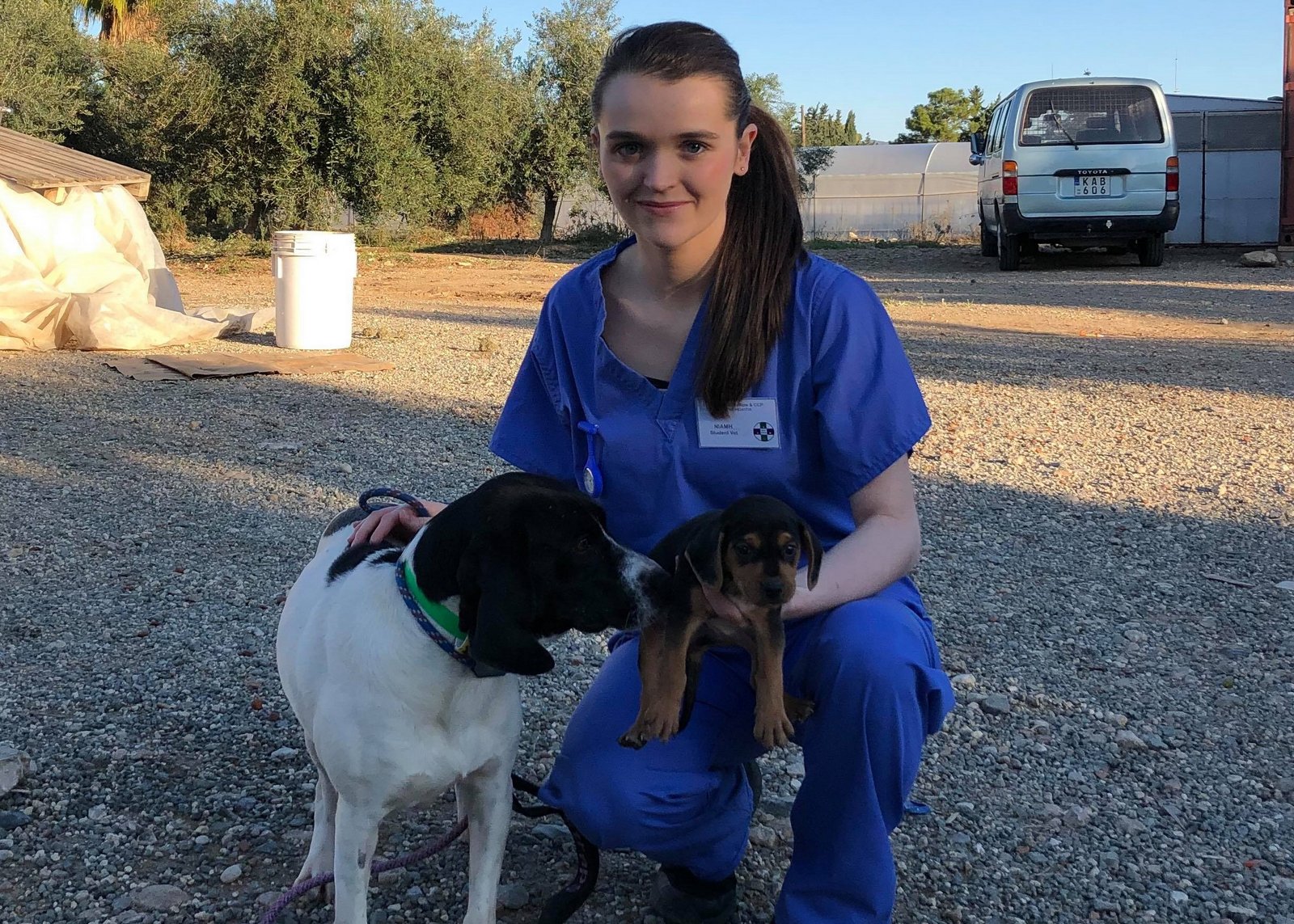We asked practising Vet and former student Dr. Naimh Fowler for her advice to people seeking to follow in her footsteps. Here’s what she said:
So, you want to be a Vet. Now what?
Studying Veterinary Medicine is an amazingly different and rewarding career choice. That being said, you will need to work hard to get into Vet school and even harder once you get there. I hope the below information is of some use and I wish you the best of luck with your application.
Work experience:
- Different universities have different requirements when it comes to work experience prior to application – Look on their websites at what species they require and how many weeks they want (they can be quite specific).
- Usually they like a good mix of veterinary practice work (small and large animal!) and then non-clinical husbandry placements (e.g. kennels, cattery, stables, lambing, dairy, city farms).
- Time spent at an abattoir and zoo placements can look good, but they are often the cherry on the cake. So, focus on the key areas (check websites) first.
- Keep a note of the jobs you do on placement, as at interviews they like to know what you actually learnt from all these placements!
- Keep a note of the dates you worked and how many days/hours you worked. Some universities get you to fill out a separate work experience form. Check their websites for the date this needs to be completed by as it is often different to the UCAS deadline.
- Try and get references from each placement – Some Universities allow you to email these as part of your application.
- I found all my placements through google searches. I got lots of replies saying they couldn’t take students, don’t be put off, you will find placements just be persistent.
GCSEs:
- Varies depending on the Uni!
- As a guide expect to need:
- At least five A grades – Including Biology, Chemistry and Physics
- At least a grade B in English language and Maths
A-level:
- Grades required are either A*AA, AAA or AAB
- Three A2 subjects required varies depending on the Uni but for most Biology and Chemistry are a necessity
Where to apply?
- Currently, there are 8 Universities in the UK that offer Veterinary Medicine (surgery) courses:
- Royal Veterinary College (University of London)
- University of Liverpool
- University of Nottingham
- University of Bristol
- University of Surrey
- University of Cambridge
- University of Edinburgh
- University of Glasgow
- You can only put 4 on your UCAS application (note: your 5th choice can be used as a non-veterinary ‘backup’ choice).
- How to choose? Have a think about:
- Location – Where are you happy to spend your next 5 years? Some universities split this between two locations (e.g. at RVC we do 2 years in Camden and then the final 3 in Potters Bar)
- Grades and work experience requirements – Read the Uni websites to find out their current requirements. When I applied I put Uni of Nottingham as one of my options, not only because I liked the look of it when I visited, but because it had lower entry grades.
- Course outlines – All Veterinary Medicine courses tend to be pretty similar, but it is still worth reading the information on their websites about this.
But most importantly try to visit the open days (I know this can be difficult with the wide spread of locations, but it really helps you get a feel for the university), ask questions and meet current students!
- With courses being massively oversubscribed it is a case of taking any offer you are given. No matter which Vet school you choose I have no doubts that you will love it.
UCAS application:
- Never be afraid to ask for help – Staff at St. Julie’s were invaluable in supporting my journey to Vet school from study support to application guidance and interview prep
- A strong application (and a bit of luck) really is key in gaining a place.
- Know your deadline and start preparing well ahead of this.
- I set out my personal statement as follows but there aren’t any set rules:
- Introduction –
- Snappy and short! Why do you want to be a vet?
- Bit about work experience –
- Just pick a few of your favourites as they can see all your placements on your work experience sheet!
- I wouldn’t mention specific procedures you have seen. If you do, they will almost definitely ask you to elaborate at an interview and the questions they will ask will not be as easy as you expect – What suture material did the vet use? Why? What incision site did they use? What was the benefit of that? Etc. This was something I definitely wouldn’t have known before Uni.
- Your A-levels-
- What each subject taught you and how this makes you suitable for this course. E.g. Maths enabled me to develop my problem-solving skills.
- Your hobbies/interests outside of school –
- Having other interests outside of veterinary and outlets for the stress encountered on the course/in this profession is so important.
- Snappy conclusion –
- Sell yourself! Why are you better/more suitable than other candidates who will likely have the same good grades?
- Introduction –
Additional exams:
- Cambridge states ‘all applicants to Veterinary Medicine are required to take the Natural Sciences pre-interview written assessment at an authorised centre local to them’
- Unfortunately, I don’t know anything about this exam as it is a new addition (when I applied we sat something called the BMAT for Cambridge and RVC, but this is no longer required)
- I would advise you look into this early (find out how you apply, where you need to sit it and if there are any fees etc.) and then prepare accordingly.
- Note: To my knowledge none of the other vet schools require an additional exam but please check their websites!
- RVC and Liverpool require you to submit a work experience form (separate to UCAS application with different deadlines). Other Uni’s might too!
Interviews:
- After you submit your application the next step is to sit and wait for interview initiations.
- Please don’t be too disheartened if you don’t get one first year – I didn’t expect to get an interview never mind an offer, first time as I know how difficult this is to achieve. Always have a backup plan e.g. take a year out, gain more experience and then reapply was mine
- Some universities use the multiple mini interview format (you work your way through a series of ‘stations’ each one with a different examiner and a different topic for you to discuss or task for you to perform) whilst others have a single interview with a panel of lecturers. You may also have a group interview. Look into which the university uses in advance.
- Some questions are quite detailed and require thought, but they are not expecting you to know everything, you are not a vet yet!
- If you do not know an answer, think through it logically. You could say something like ‘I am not sure, but I think based on this experience/ this principle it could be this or ‘I do not know the answer to that but as soon as I leave this room I will find out’.
- After an interview it is helpful to write down the questions you were asked, as I found that some of the questions were similar to ones at my next interview.
- Below are a few questions to get you thinking (based on my interviews at the RVC, Liverpool and Edinburgh in 2015):
- Welfare images –
- Crufts, intensive farming, pigeon flying, obesity in companion animals etc. talk about the welfare implications, are things like this acceptable?
- Interpretation of graphs and statistics
- What do you expect the course to be like?
- How many hours a week do you think you will be in Uni/ required to study in your own time? This is to see if you have a realistic view of the course/profession.
- Have you looked into the different options a vet degree can offer?
- What else can you do other than just work in a practice? Research, government work etc.
- Your work experience form and personal statement –
- Picked out little things I had actually overlooked. E.g. I had worked on a diary farm, so what parlour type was it? I didn’t know so just described it to the interviewer, turns out it was a herringbone.
- What did you do at each placement and more importantly what did you learn?
- Talk them through an interesting case that you saw in practice –
- Have one prepared in case you get asked something similar.
- Ethical dilemmas –
- Not necessarily linked to veterinary. E.g. What would you do if you saw someone shop lifting?
- Prioritisation of tasks –
- Given a set of things you must do like cancel an appointment for this afternoon, perform a pyometra surgery, call for lab samples etc. What order would you do each in and why? Note: Pyometra is an emergency surgery so must take priority etc.
- Work out a dosage for medication when given some information
- Skulls –
- Identify the animal or breed – E.g. You may have a brachycephalic (e.g. French bulldog) and a dolichocephalic dog skull (e.g. Greyhound).
- Discuss the differences between them, common health problems associated with the animal etc.
- What are the current vaccination recommendations for small animals?
- As a side note: You may have seen in practice that some vets give cats the FeLV injection in the leg as oppose to in the neck region? This is because there has been a link between some vaccines and feline injection site sarcomas.
- Recent issues in the veterinary profession –
- BVA newsroom, MRCVS online, Vet Times etc. are all good sources of information
- Some current/important issues (at time of printing) include:
- Bovine tuberculosis – What bacteria causes TB? The procedure for TB testing? How often is it done in each area? Do you agree with badger culling? What strategies would you suggest for control? What clinical signs might you see in cattle? How might the lungs of affected cattle look at slaughter?
- Antibiotic resistance
- New law on puppy breeding (in the hopes of stopping backstreet breeding/puppy farms) – From 1st October 2018 it will be illegal to sell puppies younger than 8 weeks and anyone breeding and selling 3 or more litters of puppies a year will need to apply for a licence.

